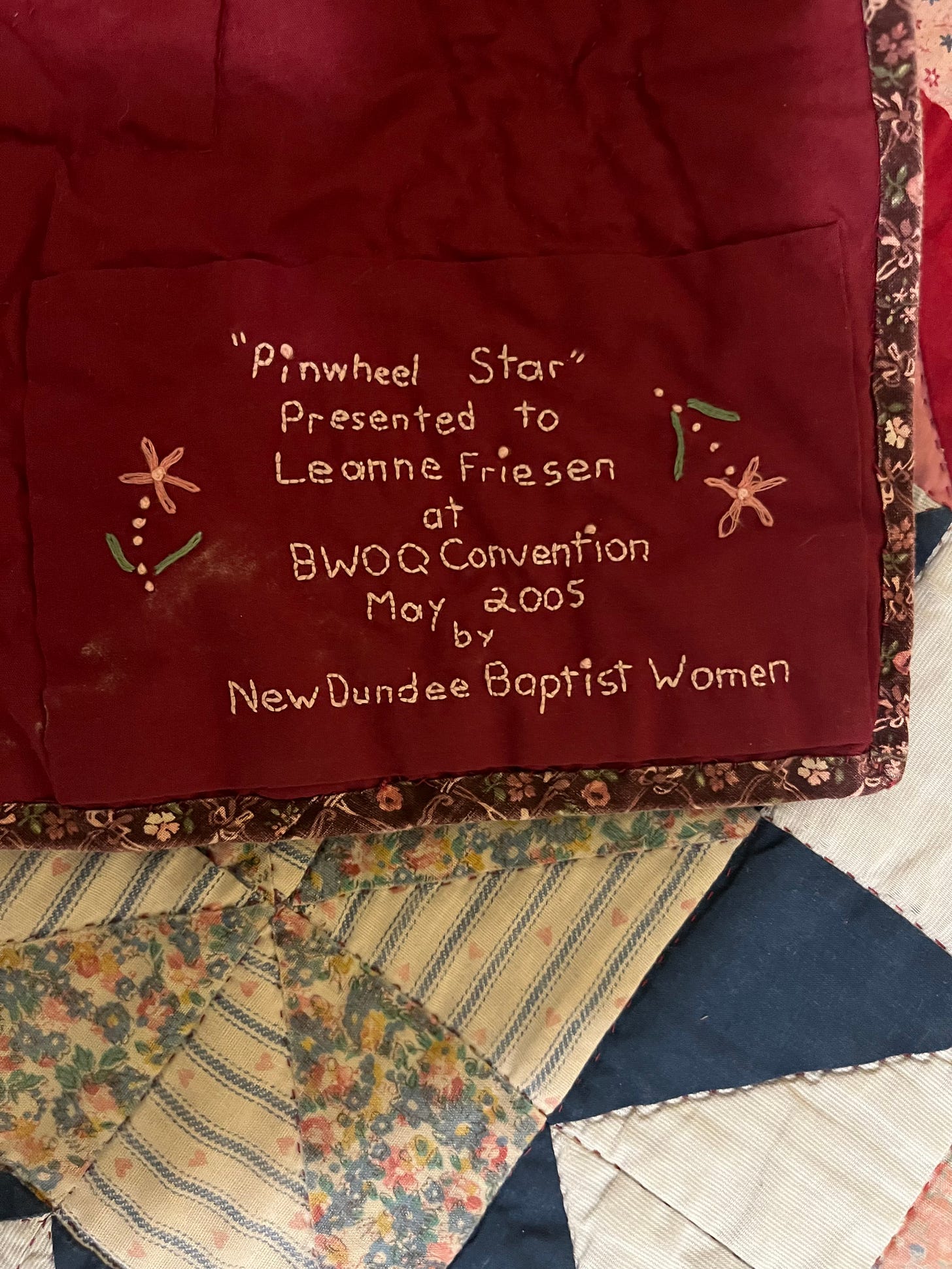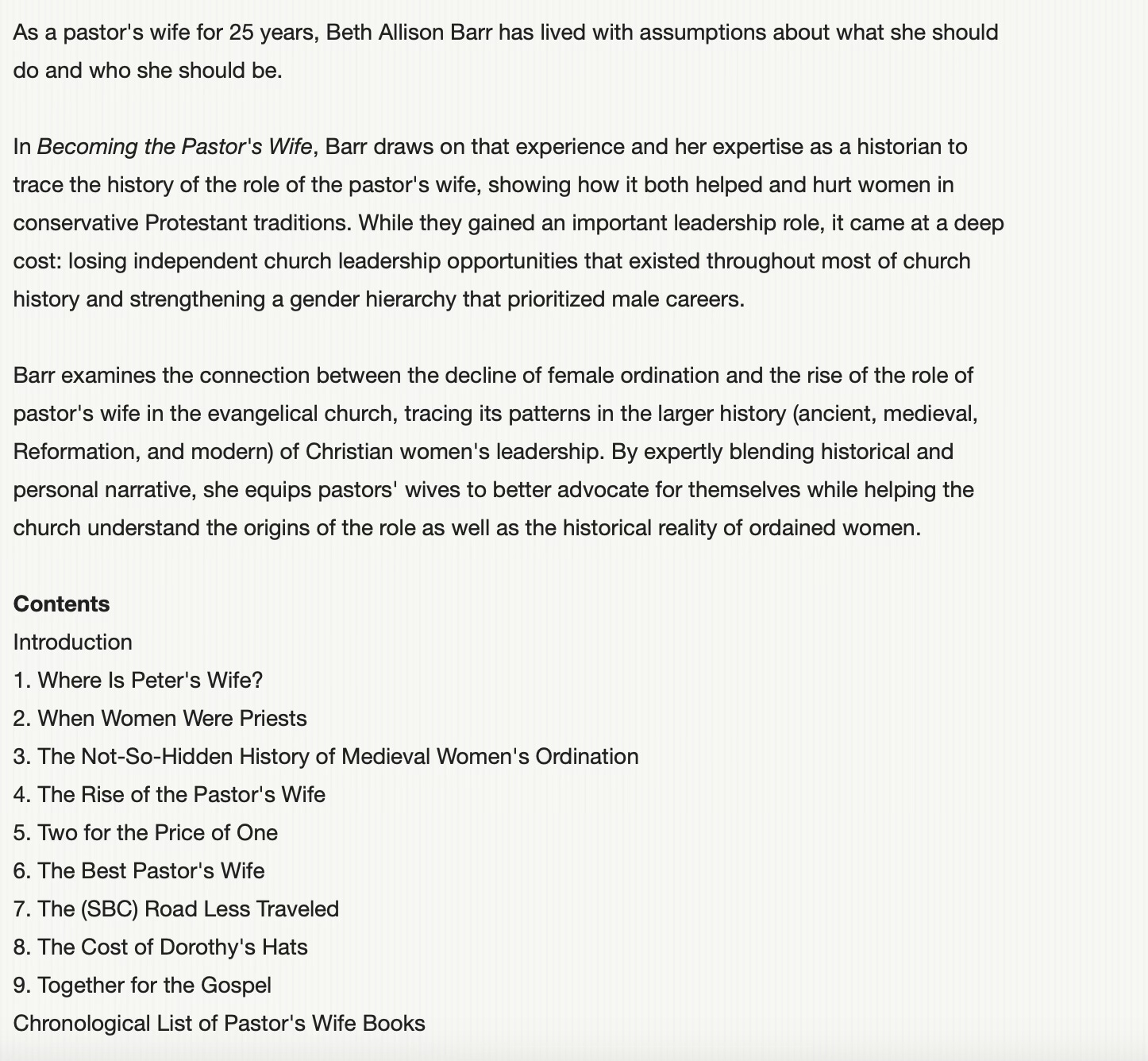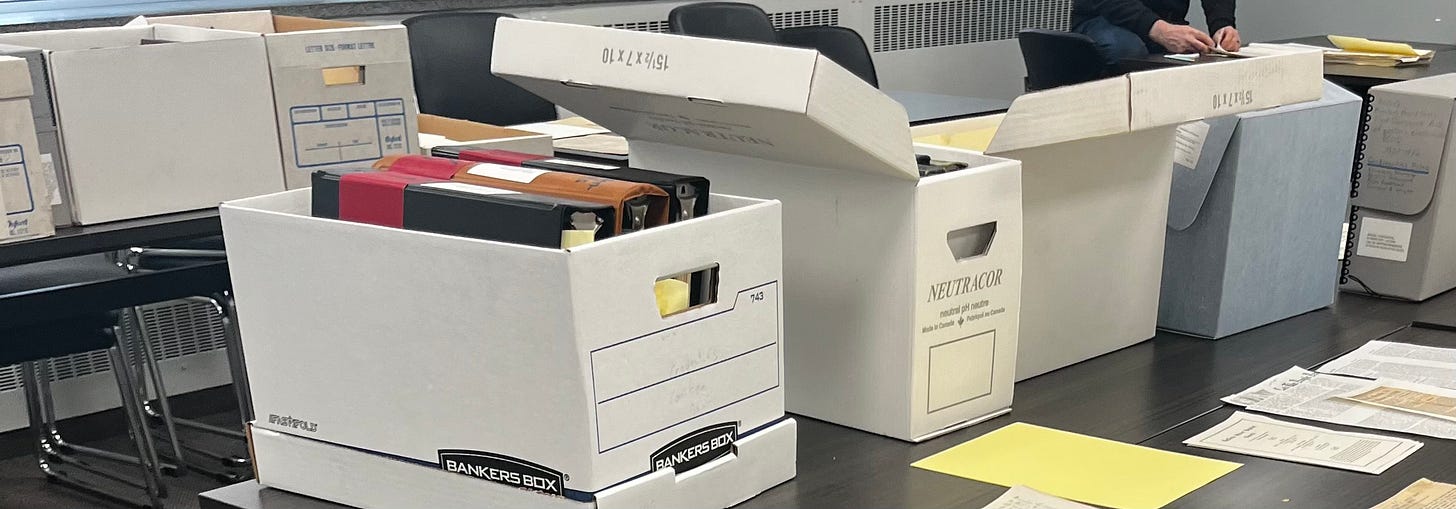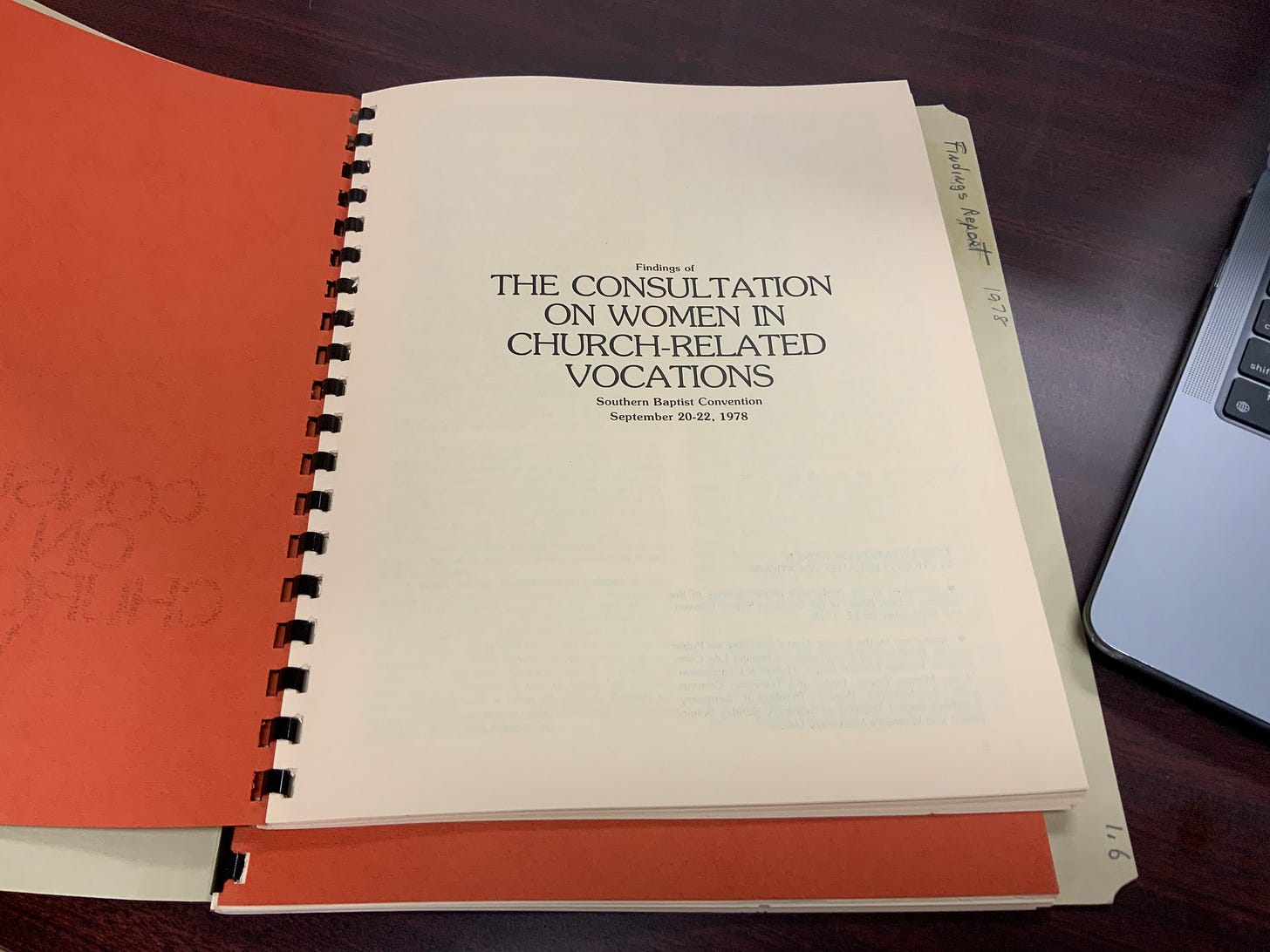Hope for Baptist Women, part 1
Canadian Baptists of Ontario and Quebec (CBOQ) chose differently from the Southern Baptist Convention (SBC) and it has made all the difference

I wore my heaviest coat and UGG boots. I even took my ski hat. It was cold in Dallas when I boarded my flight; but it would be even colder when I landed.
It was January 2024, and I was headed to the cities of Toronto and Hamilton in Ontario, Canada. I was following a lead from the Southern Baptist Convention (SBC) archives in Nashville, Tennessee that I had found in June 2023—just days before the SBC annual meeting. It would be the 5th and next-to-last archival trip for my forthcoming book Becoming the Pastor’s Wife: How Marriage Replaced Ordination as a Woman’s Path to Ministry; but this time, instead of SBC archives, I was investigating records in the main office for Canadian Baptists of Ontario and Quebec (CBOQ) as well as CBOQ archives at McMaster Divinity College.
I expected to find enough evidence to either confirm or reject my hypothesis about the SBC documents I had found.
I expected to learn more about a pastor’s wife who had served faithfully alongside her SBC ordained husband for over 40 years.
What I found surpassed my expectations. You will have to wait to learn about the archival evidence; it takes up an entire chapter in Becoming the Pastor’s Wife (chapter 8). But be assured CBOQ records confirmed my hypothesis and told a story bigger than I thought possible.

What I found outside the archives surpassed my expectations, too, because I found hope for Baptist women.

I confess, over the past few years, my hope for the evangelical world has dwindled. I have watched the SBC—a denomination I once believed committed to sharing the gospel of Jesus—become even more committed to a gender theology that privileges male power at the cost of (among others) women and sexual assault survivors. Just watch the powerful documentary For Our Daughters that connects the dots between a theology that elevates men over women and a Christian culture that enables abuse.
For the past two years, as I have researched in SBC archives, my hope dwindled further. Piecing together the hard story of Becoming the Pastor’s Wife has helped me see vividly how the SBC chose their current path. Yes, a culture of racism and patriarchy birthed the SBC; but they could have chosen to reject this past. I know they could have chosen this because I saw evidence of it in the archives. One of my chapters in Becoming the Pastor’s Wife focuses on the different choice the SBC could have made (see chapter 7 above), but let me give you a taste with evidence that didn’t make it into the book.
Did you know that in September 1978, 300 members of the Southern Baptist Convention met in Nashville to discuss a “woman’s place in church-related vocations”? Eleven SBC agencies supported the meeting, including The Southern Baptist Theological Seminary (now presided over by Albert Mohler, one of the most stalwart defenders of complementarian theology) as well as both the Foreign Mission Board and Home Mission Board. The findings report states that the meeting focused on two points:
The need for deliberate attention to career opportunities for women in the denomination, and to the educational process which prepares them for such opportunities.
The need for developing within “the system” a responsiveness to the valid concerns of women—an openness that will nurture a sense of worthwhileness all the way from the necessary tedium to the highest levels of decision-making.
In other words, the SBC was once concerned with pay equity for women, hiring practices to help women in ministry, visibility of women in denominational leadership, and even support systems for women.
I’ll stop and let you think about that for a minute.

Unfortunately, instead of continuing on the path of supporting the vocational calling of women and equalizing power dynamics among church staff and leaders, the SBC did the opposite—championing a gender hierarchy that renders both women and sexual predators less visible, enshrines pay inequity between women and men in ministry (women volunteer while men get paid), and makes gospel a theology that God created women as less than men. (Yes, I know the argument is that women and men are spiritually the same with different roles, but isn’t it time to call this argument what it is? As I wrote in The Making of Biblical Womanhood, “the greatest trick the devil ever pulled was convincing Christians that oppression is godly. That God ordained some people, simply because of their sex or skin color (or both), as belonging under the power of other people.”)
But what if the SBC had gone a different direction? What if they had followed more in the footsteps of our northern Baptist neighbors, like Canadian Baptists of Ontario and Quebec?
What if, instead of declaring that only men can be pastors, the SBC had been like CBOQ—declaring, “Pastors, both men and women, are set apart to preach the Gospel, teach the word, lead in worship, and exercise pastoral care in Christ’s name”?
What if instead of reducing women’s ministry to unpaid volunteer status, they had supported local churches ordaining women? What if instead of doxxing female pastors with a targeted list used to gain momentum for a constitutional amendment to ban women from all pastoral roles (not just lead pastor), they had celebrated the vocational calling of women with handmade quilts and ordination ceremonies?
What if instead of hounding gifted Bible teachers like Beth Moore out of their denomination, they had listened to the voices of women like Pastor Ruth Wilkinson? “For over 40 years I’d carried God’s calling to serve Him in His Church—teaching and shepherding,” she said in her ordination testimony. Her journey was difficult and she encountered many obstacles. But, in 2019, she preached her first sermon in a CBOQ church and, 4 years later, experienced the support of a CBOQ congregation laying hands on her. “Every time I stand to preach,” she said. “those hands are on my shoulder. Every time I button up my clergy collar…I know I’m there because I’m sent.” What if the SBC had chosen to support women called by God to preach so much that, like Ruth Wilkinson, female pastors felt empowered to encourage one another with the confident words, “you are sent”?
Let me say that again. While SBC women hear limitation after limitation placed on their ministry, CBOQ women are now hearing the words, “you are sent.”
What if the SBC, like Canadian Baptists today, could tell you that 16% of their pastors are women, and that they were committed to helping these women flourish (as well as increasing their numbers)? What if, instead of almost voting to ban women from pastoral positions, the SBC like CBOQ celebrated women in the highest leadership offices—including as president of the convention? After all, the same month the SBC entertained the Law Amendment on the floor of the 2023 convention, CBOQ ratified pastor Leanne Friesen as their Executive Minister.
As I have said before, in The Making of Biblical Womanhood, I told you what I already knew. What I had been teaching in my classes for years and had found in my previous research. Becoming the Pastor’s Wife is different. It tells you a story I didn’t know until I went to the archives. Writing it is one of the hardest things I have ever done, but writing it has introduced me to people like those in CBOQ—and this has helped rekindle my hope for a better future.
I edited this some from my initial publishing last night (forgive my initial proofreading errors). It precedes a week of some new voices. Stay tuned as we hear from Terran Williams and Andrew Bartlett again, Jennifer McNutt as she launches her new Mary Magdalene Book, an excerpt from Steve Bezner’s new book Your Jesus is Too American, and finally Camden Morgante as she releases her new book on purity culture.






Oh Beth, you are so faithful to making a way for women who know God is calling them to speak . . . EVERYWHERE. Hard hard work gathering data. Arguing for faceless women sitting behind computers cranking out what comes from their heart. Sitting behind microphones, honestly praying and searching what is right. Seeing human power and not letting it stop their drive toward God and His leading. And will. What a story you are living. You and Kristin and Aimee and Beth and Rachel D. Grateful for all of you. Grateful.
Thank you…I so needed to have this hope shared and embodied by our Canadian Baptist saints. I realize that I have been just looking for a body that I can be who I have been created and called to be- a shepherd and voice of hope & love, participating by the Spirit, binding up the broken hearted, freeing the captives, comforting those that mourn.